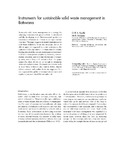| dc.contributor.author | Kgathi, D.L. | |
| dc.contributor.author | Bolaane, B. | |
| dc.date.accessioned | 2010-03-22T10:04:27Z | |
| dc.date.available | 2010-03-22T10:04:27Z | |
| dc.date.issued | 2001 | |
| dc.identifier.citation | Kgathi, D. L. & Bolaane, B. (2001) Instruments for sustainable solid waste management in Botswana, Waste Management Research, Vol.19, pp.342-353 | en_US |
| dc.identifier.issn | 0734 242x | |
| dc.identifier.uri | http://hdl.handle.net/10311/480 | |
| dc.description.abstract | Sustainable solid waste management is a strategy for
achieving environmental quality in both the developed and the developing world. Environmental quality is a necessary condition for an increase in per capita welfare
over time. The paper suggests alternative instruments for
solid waste reduction, re-use and recycling. But to be able to apply the suggested economic instruments, the
quantities and composition of the waste must be known.
Having identified the current instruments of Botswana’s solid waste management (regulatory measures, environmental
education, and economic instruments of property rates, service levy, and sanitation fees), the paper argues that these do not go far enough in enhancing environmental protection. Alternative instruments such
as solid waste collection and disposal levies, deposit refund schemes, and product levies are suggested. It is
also suggested that public environmental education and
regulatory measures should be strengthened. | en_US |
| dc.language.iso | en | en_US |
| dc.publisher | Sage http://wmr.sagepub.com/cgi/content/abstract/19/4/342 | en_US |
| dc.subject | Economic instruments | en_US |
| dc.subject | Environment | en_US |
| dc.subject | Solid waste | en_US |
| dc.subject | Recycle | en_US |
| dc.subject | Reduce | en_US |
| dc.subject | Reuse | en_US |
| dc.subject | Sustainable | en_US |
| dc.title | Instruments for sustainable solid waste management in Botswana | en_US |
| dc.type | Published Article | en_US |

